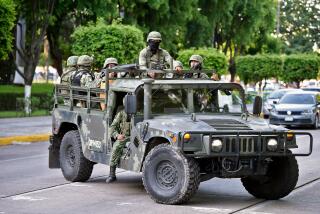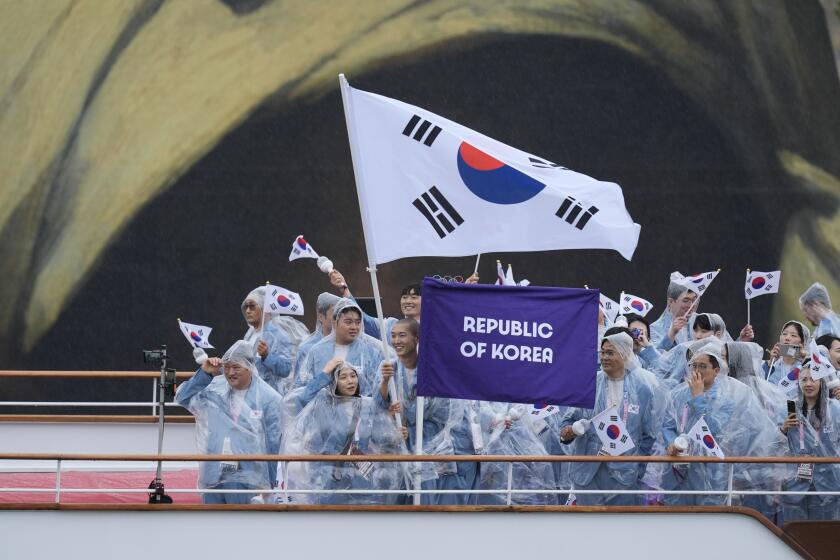U.S. to Remove All Americans From Somalia
The U.S. government will attempt to evacuate all American diplomats and private citizens from civil war-torn Somalia as soon as the fighting abates enough to get them out safely, the State Department said Wednesday.
Department spokesman Richard Boucher said that 37 embassy staff members, including Ambassador James Keogh Bishop, and fewer than 50 American civilians have been trapped in the country by the spreading violence.
Boucher said the Bush Administration ordered the evacuation even though there are no indications that Americans have been targets in the fighting between several insurgent groups and forces loyal to President Mohamed Siad Barre.
“The communications in the city are obviously difficult, so I don’t think we can say that everybody is accounted for,” Boucher said. “I am not aware of any reports of injuries or harm having come to Americans, but clearly it’s a dangerous situation.”
He said that several evacuation plans are under consideration but no decisions have been made yet. With heavy fighting reported in Mogadishu, the capital, Boucher said that the safety of the evacuees is the primary concern.
“The situation in Somalia is confused,” Boucher said. “Heavy fighting has continued for a fourth day in Mogadishu. It is not possible to say at this point which forces have the upper hand in the fighting or which forces are in control of what locations.”
Boucher said there is a heavy concentration of government troops near the military side of the airport at Mogadishu, suggesting that Siad Barre might be at the facility, as previously reported. “But we don’t know this for a fact,” he said.
News agencies reported that Siad Barre called for an immediate cease-fire Wednesday night. The report was based on a Radio Mogadishu broadcast monitored by the British Broadcasting Corp. There was no word on response by the rebels, who previously have rejected talks until Siad Barre goes.
Siad Barre came to power in a 1969 coup and pledged to reduce tribalism and corruption. But opponents charge that his regime has been repressive and that he has ruled partly by keeping rival ethnic and clan groups divided.
At least three loosely coordinated rebel groups, one of which has sought his ouster since the early 1980s, now are battling his government. Human rights groups have accused troops of killing thousands of civilians suspected of supporting the rebels.
International telephone circuits to Somalia were cut Tuesday. News agencies reported on the conflict from neighboring Kenya, primarily by interviewing refugees.
Hundreds of Somalis were reported dead in four days of fighting, many of them civilians, the Associated Press reported from Nairobi, Kenya.
Italy, a former colonial power in Somalia, planned to send two C-130 transport planes to Kenya, Somalia’s western neighbor, to evacuate about 500 foreigners remaining in Mogadishu.
But the Somali Embassy in Rome issued a communique saying that an attempted evacuation would be “interpreted by the Somali government as a destabilizing maneuver and could compromise the good Italian-Somali relations.”
“A military intervention with the declared scope of evacuating citizens is inconceivable,” the statement said.
In Washington, Abdi Jama, a spokesman for the Somali Embassy, called the decision to evacuate Americans an “overreaction.”
“This decision taken by the U.S. government--they are entitled to take any decision they want, but I can tell you that the situation is normal,” he said.
The AP report from Nairobi said that the rebels had claimed Tuesday to have cornered Siad Barre in his bunker at the military side of the Mogadishu airport, where he reportedly has been living for several months. The rebels said that more than 500 people were killed in two days of fighting.
Some Somali refugees arriving in the Kenyan capital aboard a commercial flight from Mogadishu said fighting was heaviest near the center of the city and in its northern and western suburbs, the AP reported.
The refugees said that the rebels appeared to have substantial popular support and were not harming civilians but that government forces were attacking innocent people.
In Nairobi, an aid official with long experience in Somalia said that colleagues evacuated to Nairobi by plane Tuesday night reported that an unknown number of government soldiers had defected to the opposition.
More to Read
Sign up for Essential California
The most important California stories and recommendations in your inbox every morning.
You may occasionally receive promotional content from the Los Angeles Times.






